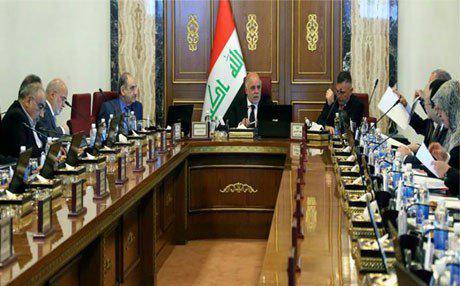Protests swept Iraq today.
التظاهرات الشعبية ضد الفساد الحكومي والفاسدين الذين حكموا وسرقوا باسم الدين وزعموا اتباع آل البيت في حكمهم
.
The protests took place in may parts of the country recalling the last wave which kicked off in December 2012 and lasted through January 2014.
Back then, Nouri al-Maliki was prime minister.
Basra protesters had complaints.
They did not have new complaints.
And while it's true that citizens of Basra had already taken to the streets last month to protest, these complaints go further back.
They are among the complaints Iraqis made when they kicked off the December 2012 protests.
These grievances were real and genuine and they remain unaddressed.
Nouri al-Maliki may be 'gone' (as Mike noted recently, it's hard to call him gone when he is now one of three vice presidents of Iraq) and Haider al-Abadi may be the new prime minister -- for approximately a year now -- but the grievances remain.
Baghdad saw protests today.
Corruption.
One of the complaints of the 12/12 thru 1/14 protests, yes.
Also a grievance in the protests that kicked off in January of 2011.
To stop those protests, Nouri al-Maliki insisted if the protesters would leave the streets, he would end corruption in 100 days.
Refresher from November 8, 2012:
In a statement at his website, Grand Ayatollah Sheikh Basheer Hussain Najafi declares the cancellation of the card system will have negative consequences. If corruption was a problem, the statement notes, then this is an indication that the anti-corruption campaign failed. The Grand Ayatollah is calling for an explanation and says it is needed quickly.
The anti-corruption campaign is a failure? That may refer to when Nouri grew nervous as Iraqis took to the streets in large numbers at the start of 2011. As February was winding down, Nouri was making many promises to try to hold on as prime minister. The Iraqi people had many demands and many justifiable complaints. There was the lack of jobs, there was the lack of public services (dependable electricity, potable water, etc.), there was the many 'disappeared' who had vanished in Iraq's 'justice' system. There was also the issue that they had voted and nothing had changed. Despite the outcome of the March 2010 election (Iraqiya came in first, Nouri's slate came in second), their votes were overridden. Nouri remained prime minister. Jalal remained president. Why did they even vote? (This was stated in word in speeches and to reporters and also in signs carried.) Nouri was spinning like crazy. And give him 100 days, he'll address corruption, he'll address jobs, he'll pull the moon from the sky and waltz it across Baghdad.
100 days came and went and nothing. Nouri plays kick the can with every problem. That means he refuses to address it. He kicks on down the road for a later time that never comes. He hopes to exhaust his rivals and he hopes to exhaust the Iraqi people. That has been his pattern since 2006.
He made those promises as the Arab Spring or 'Arab Spring' was sweeping the region and various rulers feared the people might run them out of office.
Iraq was ignored by the US cheerleaders for the Arab Spring (that would include Corrente which laughable claimed to be live blogging it).
But the protests in Iraq were rooted in genuine complaints and grievances and when the protests returned in December 2012, it was interesting to watch the Corrente types continue to ignore it -- even when protesters were attacked by government forces, even when Nouri had them attack reporters covering the protests (Corrente, like the New York Times, ignored this -- NPR and the Washington Post were two US outlets that covered the attacks).
Protests have returned.
Nouri's 100 days to end corruption in 2011?
It came and went.
All that happened was that Adel Abdul-Mahdi departed his post.
The Islamic Supreme Council of Iraq member was one of Iraq's two vice presidents during Nouri al-Maliki's first term -- Tareq al-Hashemi was the other. He and al-Hashemi were named vice presidents for a second term in November 2010. Later a third vice president was named. Iraq dropped back down to two vice presidents after the national protests and Nouri's promise to meet the demands and to address corruption in 100 days. When Nouri failed to do so, Adel Abudl-Mahdi announced he was resigning and cited the government's inability to address the needs of the people or the corruption.
Nouri never addressed the corruption.
The protests have returned.
And, as All Iraq News notes, the Iraqi Parliament has issued a statement supporting the protests on the issue of the lack of electricity. Also supporting the electricity protests? Vice President Ayad Allawi. Alsumaria notes this and that he's called for the security forces to respect the right of peaceful protest.
The reason the protests have returned is because Haider al-Abadi has done nothing to address these and other concerns.
Iraqi Spring MC notes protests took place in Najaf with the police firing guns just over the heads of protesters. Alsumaria reports that protesters in Samwah demanded better services.
Alsumaria reports Haider al-Abadi is calling the protests "an early warning sign" and insisting that austerity policies must be followed.
Well that's what the International Monetary Fund (IMF) imposes and that's why you never should take their dirty, blood money. Once you do, they own you.
Iraq never needed some billions from the IMF.
Dirty men like the State Dept's Brett McGurk stroked their dirty dicks to orgasm over the IMF loan and cowards like Antonia Juhasz refused to speak out.
Iraq brings in billions from oil each year. It is not Ethopia.
It's annual budget is enough to make every Iraqi citizen a millionaire several times over.
The IMF loan was never about helping Iraq.
It was about controlling Iraq.
The clerics in Iraq who warned about it were ignored.
Betty says this site was the only one to call out the IMF deal in the US. I hope that's not the case but I honestly am not aware of anyone calling out the deal. (If you did, the e-mail is common_ills@yahoo.com and we will gladly note you.)
Haider al-Abadi was not installed last year by the White House because he was someone who would fight for or protect the Iraqi people.
He is as corrupt as Nouri.
No surprise.
Like Nouri, he is a Dawa Party member and he also was part of Nouri's State of Law coalition and Arabic social media has been filled with video of the two men giddy and giggling over shared secrets.
Haider was a re-set.
Anyone could have been.
But Nouri was so corrupt and so out of control that Iraq could not survive a third term.
The people of Iraq needed to know that there was a chance at change in some way or form.
Haider was a re-set.
And he has failed to change anything.
Which is why people are again taking to the streets.
People, of course, include reporters and they staged a sit-in today in Baghdad calling for Article 14 of to be repealed.
Protests also took place in northern Iraq's KRG where protesters gathered before the KRG Parliament to lodge their objections to the Turkish war planes dropping bombs on the region.
All Iraq News reports that Haider al-Abadi publicly declared today that Turkey needs to respect Iraq's sovereignty.
Alsumaria adds that he declared the PKK (the supposed target of Turkey) exists in Turkey and not Iraq and that the Iranian government is also opposed to the PKK but they (the Iranian government) have not bombed Iraq.
On the first day of the new month, UNAMI releases their death toll figures for July.
iraq
all iraq news
al mada
alsumaria
 اعلام الربيع العراقي
اعلام الربيع العراقي












 #IRAQ شمرية العراق
#IRAQ شمرية العراق




 Mustafa al-Najafi
Mustafa al-Najafi









 Ali Ajeena
Ali Ajeena
 Hayder al-Khoei
Hayder al-Khoei



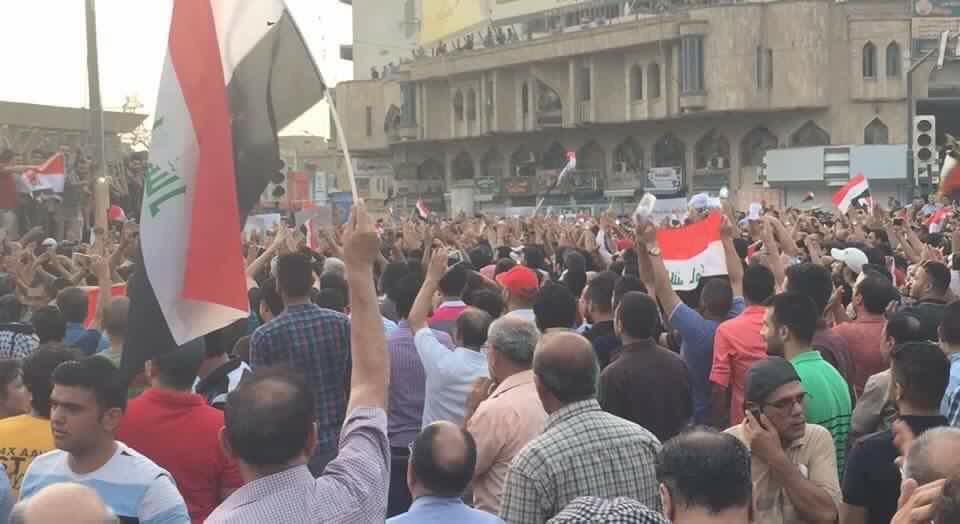
 Brett McGurk
Brett McGurk
 UNAMI
UNAMI
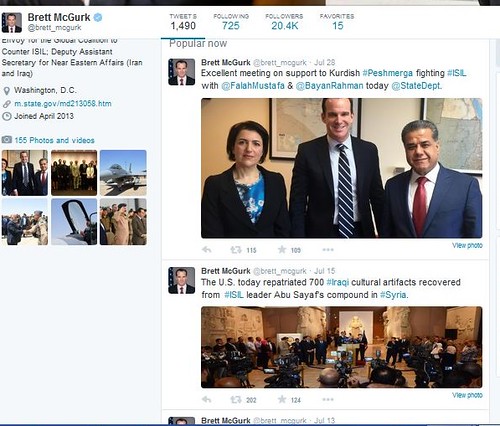
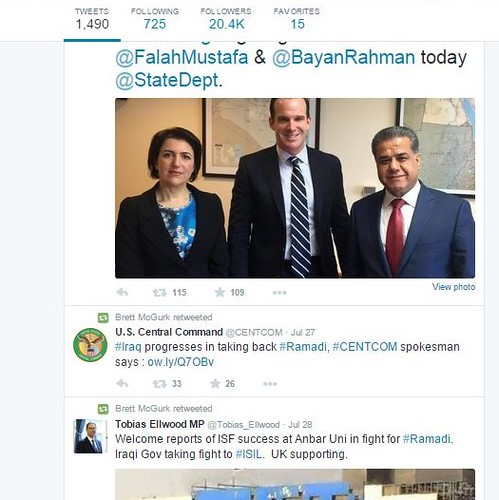
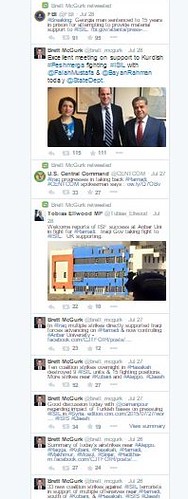
 Nasser Atta
Nasser Atta
 Rudaw English
Rudaw English
